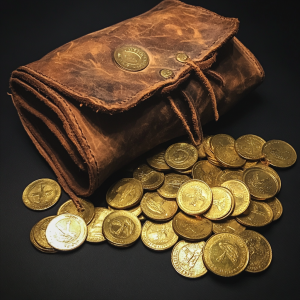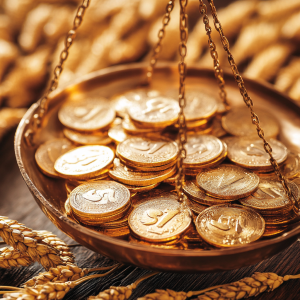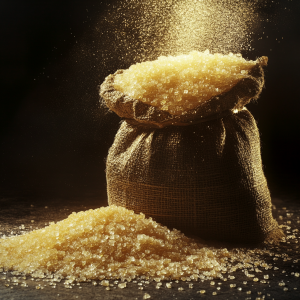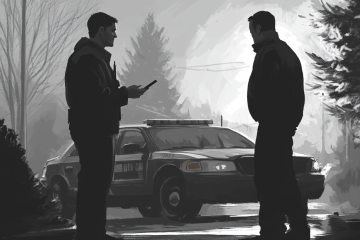
Gold should not be relied upon for barter
Gold: The Shiniest Prepper Debate That Nobody Wants to Make Change For
Gold. It’s the Beyoncé of metals—shiny, desirable, and endlessly talked about. Preppers love to toss around the idea of gold as a cornerstone of preparedness, but let’s get real for a second. While gold might sparkle in a 401(k) portfolio, relying on it in a “society-down” scenario sounds about as practical as stocking up on avocado toast for the apocalypse. Let’s dig into why gold might not be the golden ticket some folks think it is.
“How Do You Make Change for a Gold Coin?”
Picture this: a guy rolls up to your humble, post-apocalyptic sugar shop, drops a gold coin on the counter, and asks for a bag of sugar. Sweet deal, right? Wrong. How are you supposed to make change for a gold coin? You’re not exactly carrying a precision scale in your back pocket, and last time I checked, nicking a sliver off the coin with a butter knife isn’t an exact science.
In a functional society, you have banks and institutions to sort out the logistics. In a barter-driven world, though, you might as well be trying to split atoms with a butter churn.
“Is This Real Gold or Did You Paint a Rock?”
Be honest—how many of us are secretly thinking, How do I even know this is real gold? Unless you’ve got a jeweler’s loupe, an acid testing kit, and a master’s degree in metallurgy lying around, you’re taking that “gold” on faith. Maybe it’s legit, or maybe you’re trading your sugar stash for a gold-plated commemorative coin from the Franklin Mint. The apocalypse doesn’t come with return policies.
“How Much Does It Weigh, Anyway?”
Weight matters when it comes to gold, but how are you going to know without a highly accurate scale? Are you eyeballing it? Using your kid’s science fair balance? Gold is measured in troy ounces, which sounds like something a pirate made up, and the value fluctuates depending on purity and market conditions. Unless you’ve got time to Google “spot price of gold” mid-barter (spoiler: you won’t), you’re essentially guessing.
“Why Would I Accept Gold Instead of Something I Actually Need?”
Here’s the kicker: why would you accept gold over, say, a sack of potatoes or a pile of firewood? Gold isn’t going to keep you warm at night, fill your belly, or patch a roof. It’s a promise of future value, sure—but promises don’t fuel generators or boil water. In a survival scenario, practical goods win every time. You can’t chew on a gold bar, and if you could, I imagine it’d taste terrible.
“Sounds Like a Scam to Me”

Unless you’re an expert on gold and have a way to spend it, it’s a bad idea for preppers
And let’s not ignore the optics here. In a world where most people have never seen gold outside of jewelry, someone rolling up with a gold coin to buy your sugar feels a little…suspicious. How do they even have gold when everything else has fallen apart? Did they rob a mint? Are they some kind of apocalypse con artist? I don’t know about you, but my scam radar would be going off like a car alarm.
“What’s Gold Worth, Anyway?”
Here’s a thought that doesn’t get discussed enough: gold prices are just as manipulated as the stock market. If you think the value of gold is immune to the whims of Wall Street, central banks, or international markets, I’ve got some magic beans to sell you. The truth is, gold’s price fluctuates based on a tangled web of speculative trading, currency manipulation, and global uncertainty.
And let’s not forget: gold has no fixed value. Today’s ounce of gold might get you a month’s worth of groceries. Tomorrow, it might buy you a can of beans—or nothing at all if no one’s accepting gold in your neighborhood. Compare that to a bucket of rice: you know exactly what it’s worth. It’ll fill bellies, last for years, and trade hands in a pinch. Gold? That shiny coin’s buying power depends entirely on someone else agreeing it’s valuable.
“Would You Sell for Gold?”
This is the question most preppers don’t ask themselves. Sure, they love the idea of buying with gold, but what about selling? If someone offered you gold in exchange for your food or supplies, would you actually take it? Would you know what to do with it? Would you even want to? Unless you’re confident you can trade it elsewhere, that shiny coin is a gamble—not a guarantee.

Sugar beats gold
Gold in Your 401(k)? Absolutely. Gold for Barter? Maybe Not.
Now, don’t get me wrong—gold has its place. It’s great for diversifying your retirement portfolio or as a hedge against inflation. If you’ve got a 401(k) or IRA, adding some gold can be a smart move. But stocking up on gold for a society-down scenario? Let’s just say it’s not topping my list of must-haves.
Instead, focus on tangible, practical goods: food, water, medical supplies, tools, and skills. These are the things that will keep you alive and thriving when the chips are down. Gold is shiny, sure—but it won’t keep the lights on or feed your family.
Preparedness is about more than stockpiling stuff—it’s about understanding what truly holds value. In a world turned upside down, that value comes from meeting basic needs, building strong communities, and having the skills to adapt. Gold might be glittery, but in a barter economy, the real treasure is in what you can use—not just what you can hold.
So, next time someone tells you to hoard gold like a dragon in a fairytale, feel free to laugh, nod politely, and then go stock up on more sugar instead. Because when it comes to preparedness, practicality always beats shiny.

